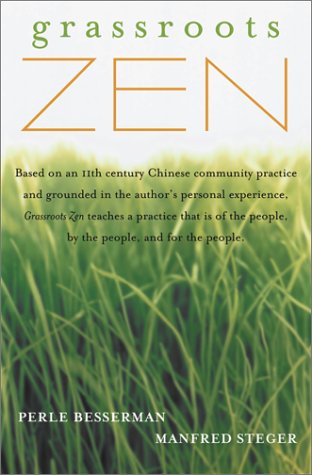
Grassroots Zen
فرمت کتاب
ebook
تاریخ انتشار
2015
نویسنده
Manfred B. Stegerناشر
Tuttle Publishingشابک
9781462918270
کتاب های مرتبط
- اطلاعات
- نقد و بررسی
- دیدگاه کاربران
نقد و بررسی

June 11, 2001
Married university professors and authors Steger (Gandhi's Dilemma: Nonviolent Principles and Nationalist Power) and Besserman (The Shambhala Guide to Kabbalah and Jewish Mysticism) name and describe a phenomenon that is occurring all over the country: relatively small, democratically run groups of Zen Buddhist practitioners are banding together and sustaining a sangha, or community, free of the hierarchy and formality of the monastery. After conceiving this way of practice with the Princeton Area Zen Group, the members discovered that they were actually operating within an old Chinese tradition (ts'ao-pen ch'an) wherein "without official sanction from Buddhist priests and beyond the monastery walls... like-minded men and women gathered together to sit in meditation." The authors assert, "We eliminated monastic robes and tonsure , as well as every vestige of militarism and male dominance inherent in Japanese Zen training." They also prescribe how to hold on to what they perceive to be the essential elements: zazen (formal sitting meditation), sesshin (silent meditation retreats), dharma (talks by teachers), koans (verbal puzzles that provoke insight) and dokusan (student-teacher interviews). In Zen practice "nothing special" can mean a kind of ideal, but compared to the flood of fine Buddhism books now available this is also "nothing special" in the more commonly applied turn of the phrase. Ultimately, it offers not much more than a new name for the heart of a hallowed practice.

July 1, 2001
There is no want of guides to Buddhism, and even Zen Buddhism, for the American market. Steger and Besserman offer something quite different, and quite welcome: a truly domesticated but deeply grounded approach to Zen for American life; a Zen that comes to terms with, and ultimately transcends, the hierarchical, sexist, otherworldly, and pseudomilitaristic overtones of the Zen tradition. Steger and Besserman offer the Zen Buddhism likeliest to be practiced by the greatest number of Americans, and their work deserves applause. For most collections.
Copyright 2001 Library Journal, LLC Used with permission.

























دیدگاه کاربران